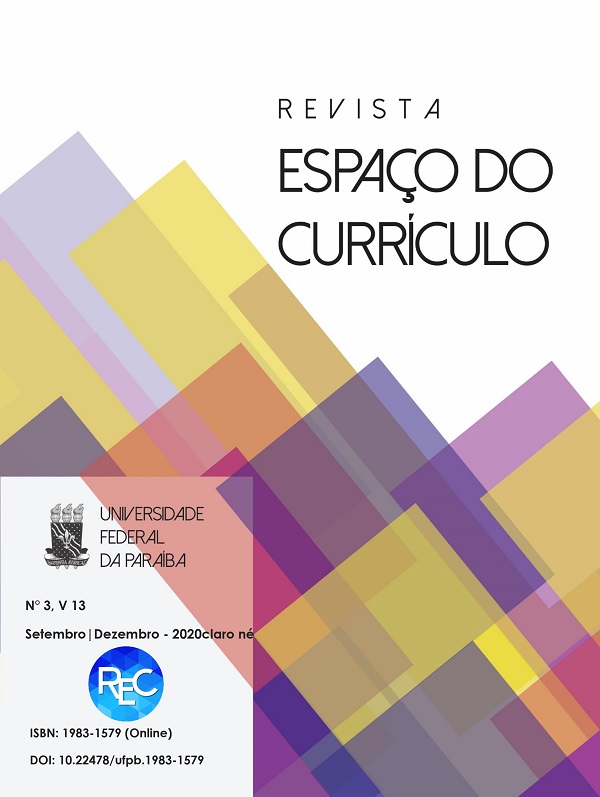IKINS AND CROSSROADS
Orunmilá and Exu in the ways of knowlwdge, education and decolonization
DOI:
https://doi.org/10.22478/ufpb.1983-1579.2020v13n3.54228Keywords:
Education, Knowledge practices, Decolonization, Exu, OrunmiláAbstract
This article problematizes education in dialogue with presences, knowledge and grammars subordinated by colonialism. I highlight how the attack on diversity runs directly through actions that operate in the armor and in the precariousness of explanatory principles that protect other sensations and experiences of the world. Thus, diversity is fundamental for the emergence of routes that affect beings in favor of life, dignity, good living and cognitive and social justice (SANTOS, 2008). Education is thought of here as a phenomenon crossed between experience, learning, knowledge and ethics whose motto is the explanatory principles of Yoruba culture, especially the orishas Exu and Orunmilá. Exu transferred to the Americas is the dynamic principle of each and every movement, creation, communication and language. Orunmilá is about knowledge and the multiple possibilities of interaction with it. Both are invoked here as philosophical and pedagogical availability to propose enunciative, political and epistemological turns that launch the criticism of education as a feeling, doing and thinking necessary for the registration of plural paths, responsible for difference and powerful for decolonization.
Downloads
Metrics
References
BENJAMIN, Walter. Magia e técnica, arte e política – ensaios sobre literatura e história da cultura. São Paulo: Brasiliense, 1994, 2012.
CARNEIRO, Aparecida Sueli. A Construção do outro como não-ser fundamento do ser. Tese de doutorado. Programa de Pós-graduação em Educação da Universidade de São Paulo. São Paulo, 2005.
FANON, Frantz. Pele negra, máscaras brancas. Tradução de Renato da Silveira. Salvador: EDUFBA, 2008.
FREIRE, Paulo. Pedagogia do Oprimido. 17º ed. Rio de Janeiro: Paz e terra, 1987
______. Educação como prática da liberdade. - Rio de Janeiro: Paz e Terra, 1967.
______. Pedagogia da esperança: um reencontro com a pedagogia do oprimido. – 21º Ed. – São Paulo: Paz e Terra, 2014.
GROSFOGUEL. Para uma visão decolonial da crise civilizatória e dos paradigmas da esquerda ocidentalizada. In: BERNARDINO-COSTA, Joaze; MALDONADO-TORRES, Nelson e GROSFOGUEL, Ramón, Decolonialidade e pensamento afrodiaspórico. – 1. ed. Belo Horizonte: Autêntica Editora, 2018.
KRENAK, Ailton. Ideias para adiar o fim do mundo. 1º ed. – São Paulo: Companhia das Letras, 2019.
QUIJANO, Anibal. Colonialidade do poder e classificação social. In: SANTOS, Boaventura de Souza e MENEZES, Maria Paula, Epistemologias do Sul. São Paulo: Cortez, 2010.
RAMOSE, Magobe. Sobre a legitimidade e o estudo da Filosofia Africana. Ensaios Filosóficos, Rio de Janeiro, v. IV, out. 2011
ROSA, João Guimarães. Grande sertão: veredas. Rio de Janeiro: Nova Fronteira, 2001.
RUFINO, Luiz. Pedagogia das Encruzilhadas- Rio de Janeiro: Mórula Editorial, 2019.
_____. Batalha contra o desencanto: a encruza como chegada (p.26, 29). In: Revista Cult. São Paulo, 2020.
RUFINO, Luiz & SIMAS, Luiz Antonio. Fogo no Mato: A Ciência Encantada das Macumbas. 1. Ed.- Rio de Janeiro: Mórula, 2018
SANTOS, Antônio Bispo dos. Colonização e Quilombos: modos e significações. Instituto Nacional de Ciência e Tecnologia de Inclusão no Ensino Superior e na Pesquisa- INCTI. Universidade de Brasília, 2015.
SANTOS, Boaventura de Sousa. A gramática do tempo: para uma nova cultura política. São Paulo: Cortez, 2008.
______. Renovar a teoria crítica e reinventar a emancipação social. - São Paulo: Boitempo, 2007.
SODRÉ, Muniz. Pensar Nagô. – Petrópolis, RJ: Vozes, 2017.
VIVEIROS DE CASTRO, Eduardo. A inconstância da alma selvagem e outros ensaios de antropologia. São Paulo: Cosac Naify. 2002.
Downloads
Published
How to Cite
Issue
Section
License
By submitting an article to Curriculum Space Journal (CSJ) and having it approved, the authors agree to assign, without remuneration, the following rights to Curriculum Space Journal: first publication rights and permission for CSJ to redistribute this article. article and its metadata to the indexing and reference services that its editors deem appropriate.
















